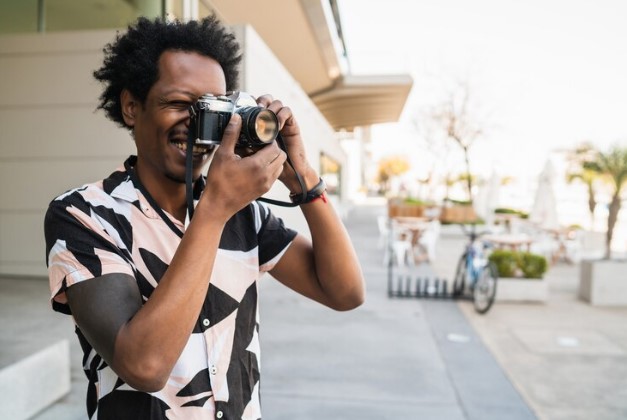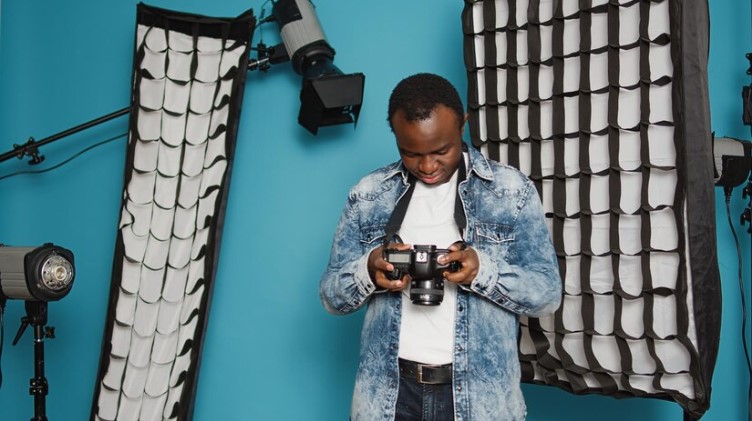The need for top-quality snaps is increasing, with Kenyans embracing new events like baby showers, bridal showers, and gender reveals. Almost every occasion needs a photography business in Kenya to capture memories.
To start a photography business in Kenya, you’ll need a minimum capital of Kshs 300,000. This will earn you average returns of Kshs 30,000 to Kshs 100,000, depending on the niche and number of clients you serve.
Photography is a versatile field with numerous niches, including studio and outdoors. Depending on your marketing and photography skills, you can make massive returns.
In this blog, I will cover the following:
- The fundamentals of setting up a photography business
- How to start a photography business(step-by-step process)
- How to boost your business returns
- Commonly asked questions

Let’s take an inside look!
The ABCs of Photography Business
Pros of Opening a Photography Business
- Unlimited Prospects
Photography is not limited to one area – you attract clients from all aspects. Whether you specialize in portraits, landscape photography, or wedding photography, you can always find prospects from different categories, depending on their preferences.
- Flexible Pricing
Typically, in other businesses, especially those that deal in products, you’re expected to remain within a specific price range. Otherwise, you will lose clients as they find their way to alternative cheap sellers.
Fortunately, the photography business does not restrain you to specific figures. You choose your niche, photography style, and prices for each service you provide.
- Explore New Experiences
Do you love traveling? Opening a photography business in Kenya can help you quench your wanderlust. You can tour the world or the country while making money through wildlife photography or covering special events in different locations, for instance, weddings or Ruracio events.
- Lucrative Side Gig
If you want additional income, venturing into photography is a great option. The versatility of the photography business allows you to schedule and price freely. Hence, you can utilize your off days to make money through photography.

Cons of a Photography Business
- Capital Intensive
Starting a photography business in Kenya requires a high capital of at least Kshs 300,000. This stops many aspiring photographers from venturing into this business as they can’t raise such capital.
However, if you’re struggling with startup funds, you can work as an apprentice for an established company or employer. Then, save up gradually to purchase basic equipment and start your own photography business.
- Fluctuating Income
The amount of money you make varies depending on the number of clients you serve and the type of gigs you cover. For instance, a baby shower or studio session will yield less returns compared to covering a wedding.
Hence, you must develop an effective marketing strategy to ensure your calendar is full for maximum returns.
- Stiff Competition
There are many established photography brands that clients trust. This makes it challenging to acquire your client base. However, you can find ways to stand out from other photographers through appealing offers, discounts, and exceptional services.
What You Need To Start a Photography Business
The photography requirements may vary depending on your niche. Nevertheless, here are some of the basics you must acquire
| Requirement | Price |
| Camera | Kshs 100,000 and above |
| Computer | Kshs 25,000 |
| Photo editing software | Kshs 5,000 |
| Lenses | Kshs 60,000 |
| Tripods | Kshs 10,000 |
| Stands | Kshs 7,000 |
| Lighting and backdrops | Kshs 30,000 |
| Permits and licenses | Kshs 5,000 |
| Camera bags | Kshs 3,000 |
| Calibrator | Kshs 10,000 |
| Business registration | Kshs 5,000 |
| Printer | Kshs 40,000 |
| Rental space (for photo studio) | Kshs 10,000 and above |
| Total | Kshs 310,000 and above |
Photography Niches

Depending on your preferences and returns, you can choose one field to specialize in as a photographer. Here are the most popular niches in Kenya
- Stock Photography: You see those high-end images on blogs? Professional photographers take them and sell them to blog owners through Stock and FreePik. Usually, you provide a collection of your photos with a price tag, say $6. For every photo a client uses, you get $6, so if they use 10, you earn $60.
- Event Photography: Event photography focuses on occasions such as expos and company launches. These gigs are high-end and earn photographers massive returns.
- Wedding Photography: Wedding photographers cover wedding events mostly on weekends. This niche can be less lucrative; hence, you must implement a strategic marketing plan to fill your calendar.
- Wildlife or Scenic Photography: You can make money taking wildlife or landscape shots. However, you must have exceptional skills to win in this field, as already established professionals exist.
- Portrait Photography: This is the most popular niche in Kenya, with professionals selling personal, landscape, and animal portrait photos.
How To Establish a Photography Business In Kenya

Setting up a photography business for the first time can be an uphill task. Fortunately, this step-by-step guide walks you through the entire process of opening a photography venture.
Let’s dig deeper!
Step 1. Refine Your Photography Skills
To compete with existing businesses, you must stand out. Although you might have difficulty affording pricey marketing and photography equipment, you can utilize your photography skills to attract prospective clients.
You can accomplish this by enrolling in a photography course. This program will expose you to business and technical skills. In addition, you can attend photography events to network with established photographers.
Getting a mentor makes sharpening your skills and running your photography business in Kenya easier.
Step 2. Conduct Market Research
Conducting market research helps you to identify what exists in the market. It also reveals the gaps in the photography industry, giving you a competitive advantage as you strategize to penetrate the market.
In addition, you’ll collect essential information such as the initial capital, market segmentation, risks, and level of competition. You can leverage this information to develop a solid business plan that will help you establish a profitable venture.
Step 3. Write a Business Plan for Your Photography Business
The initial stages of a business require a business plan, and photography is not exempted!
Why create a business plan for your photography business when you can begin this business solely?
While starting a photography business can be easy and affordable if you’re venturing into a niche that allows you to operate alone, future growth calls for strategic actions.
Here are some of the essential elements that your business plan covers:
- The Initial Capital: A business plan has the range of capital you’ll need to start a small, medium, or large photography business.
- Risks: Every business has challenges and risks that can lead to losses. Mastering them helps you develop strategies that can mitigate them to maximize your returns.
- Market Size: What’s the market size? How many people will you serve?
- Competition: Your business plan should show the competition level you’ll face when you start your photography business. How many photography businesses exist in your location?
- Ownership: Do you plan to operate your photography business as a sole proprietorship or partnership?
Step 4. Choose a Photography Niche

You can’t be a jack of all trades when starting your business journey. You need to choose a niche that will allow you to fetch maximum profits while maintaining flexibility if you’re venturing into photography as a business.
In addition, you should assess the niche’s growth potential. You don’t want to invest your hard-earned money in a niche that will collapse after a few years. Study the trends and settle for the highest-yielding line.
Here are a few questions to guide you on this step:
- What’s the demand for outdoor or studio photography services?
- How much flexibility does wedding photography offer?
- Which niche has the highest-paying gigs?
- What are the profit margins of each photography niche?
Step 4. Find The Best Location
The main things you should consider when choosing a photography business location include security, accessibility, and visibility of the premises. This will allow for a seamless operation of your business.
You should also take advantage of institutions such as banks or Huduma offices. Establish your studio next to them since any registration or application in these facilities requires passport printing and photocopy services.
Step 5. Secure Legal Documents
The government of Kenya requires you to complete specific application processes to get the necessary business documents.
- Business Registration: The business registration certificate is the first document you should apply for. Do you recall we had an ownership section in the business plan? Now is the time to complete your application on eCitizen.
- Business Permit: Once you secure a business certificate, you should apply for a single business permit. Here, you’ll part with Kshs 5,000 yearly.
- Licenses: County authorities have a mandatory requirement for businesses to apply for authorization. So, ensure you apply for it before you launch your studio to avoid constant disruptions.
Step 6. Acquire Photography Equipment

It’s advisable you purchase new photography equipment and accessories. However, if you’re working on a tight budget, you must thoroughly assess them before investing your money in a damaged gadget.
Remember, you cannot compromise on some equipment as they determine your work’s quality. Pay attention to the camera, lens, storage devices, and lighting equipment.
Step 7. Find a Premium Photo-Editing Software
Your shots will not always be perfect, especially if you’re an outdoor or wedding photographer. You don’t have total control of the lighting, which might result in an imbalance tampering with your snaps.
Fortunately, photo-editing software can help you modify your clients’ images to the desired preferences. The most popular options in the Kenyan photography businesses include Photoshop and Lightroom. Mastering the use of these two will help you improve your image qualities.
Step 8. Insure Your Business
Fires, floods, and theft are unexpected occurrences that can shut down your business. The best way to mitigate this is by taking insurance coverage for your business. If any of these occur, you will be compensated and resume running your business.
Nevertheless, you must be careful when choosing an insurance company. Start by assessing the different offers, then select the most beneficial for your business.
Step 9. Launch Your Photography Business
Now that you have all it takes to run a photography business, it’s time to launch your venture. Make official announcements on local social media pages and local media houses if you can afford it to achieve the best reach.
Then, provide free photo sessions on the launch date for people to get a feel of your services. Impress them to fetch a good client base for your business. In addition, you can ask the local media company to cover and air your launch event to spread awareness.
How To Boost Your Photography Business

Tip 1. Have an Outstanding Portfolio
Whether you plan to offer image editing or wedding photography services, you need a portfolio showcasing your excellent photography skills. Take stunning pictures and compile them into a great portfolio you can send to prospective clients.
You can also use your portfolio to cold pitch your services. Ensure they’re top-notch to convince clients to hire you.
Tip 2. Find a Mentor
Running a business with stiff competition can be daunting. However, when you find an expert in the field to guide you, you will achieve exceptional growth. In addition, you’ll learn pro hacks that will help you refine your skills and maximize your returns.
It’s easier to navigate a photography business journey with a mentor!
Tip 3. Provide Excellent Customer Service
Customers are loyal to providers that cater to their needs and preferences. As a result, you should offer excellent customer service to gain repeat clients and free referrals. Learn how your clients like their shots taken and their preferred light adjustments to give them satisfactory services.
Tip 4. Market Your Photography Business
Business owners are raking in massive returns through social media marketing. The more reach you attain with an outstanding portfolio, the more leads and sales you get for your business. Don’t limit yourself to specific accounts; you can explore uncommon options such as LinkedIn and local media.
Also Read:
- Starting a Phone Accessories Business In Kenya
- 11 Lucrative and Unique Business Ideas In Kenya
- How to Start an Online Business in Kenya
Frequently Asked Questions
1. Does Photography Pay Well In Kenya?
Photography returns vary depending on the niche and number of gigs you complete. Moreover, your skill level and reputation also contribute to your income. Note that every photographer has unique pay rates that determine how much they make daily, monthly, or yearly.
2. What are The Requirements for a Photo Studio?
To open a photo studio, you’ll need the following:
- A rental space
- A high-quality camera
- Lenses
- Lighting equipment
- Tripod and stands
- Reflectors
- Backdrops
- Photo editing software
- Changing room
- Filters
- Props
- Memory cards
- Computers
Ready To Open Your Photography Business In Kenya?
Photography can be lucrative, especially if you’re looking for a side job. However, you must have enough funds to acquire all the necessary equipment, legal documents, and rental space.
Don’t get stuck setting up your photography business in Kenya; you can ask for help from reputable business experts.
Visit the Cent Warrior shop for more professional financial guidance.







